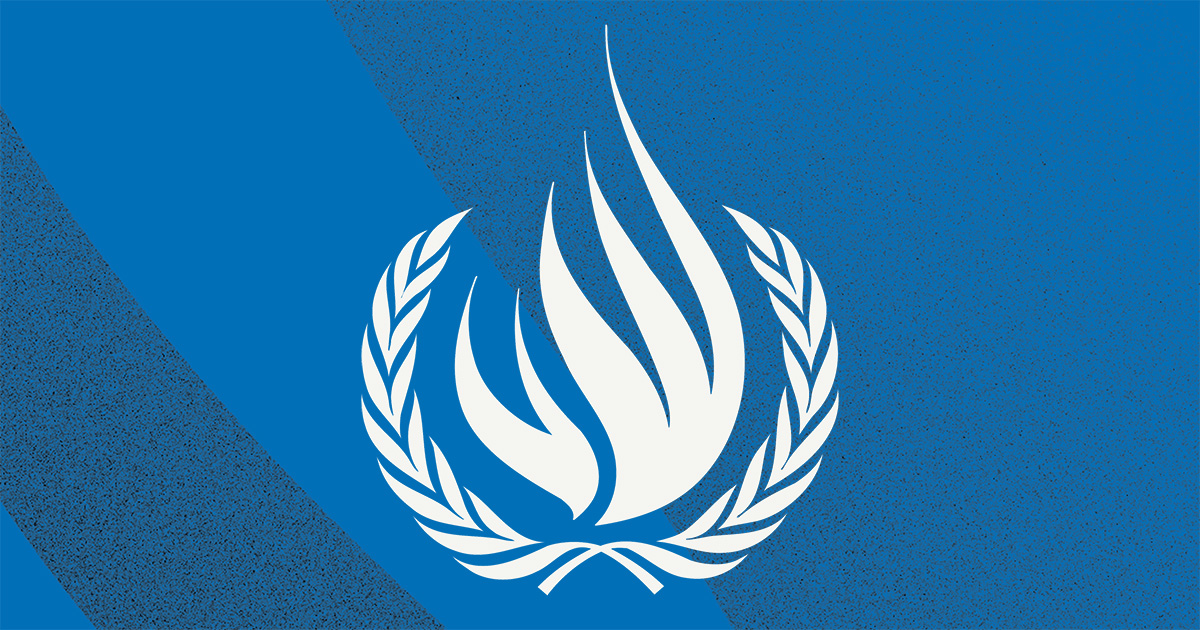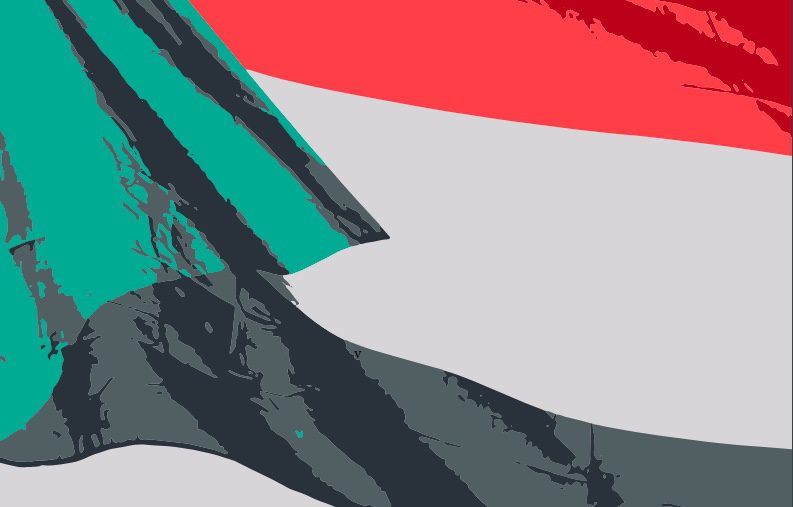
GENEVA (29 July 2022) – Ahead of the World Day Against Trafficking in persons, a group of United Nations and regional human rights experts* raised serious concerns about the risks of trafficking for those displaced by conflict, including children.
“Conflict situations greatly increase the risks of trafficking in persons. Women and girls, particularly those who are displaced, are disproportionately affected by trafficking for the purpose of sexual exploitation, often combined with other forms of exploitation, such as forced and child marriage, forced labour and domestic servitude. Trafficking in persons of all ages is often a tactic used by armed groups, contributing to continued instability, conflict and displacement, hindering processes of peace building, durable solutions to displacement, and transition to peace and security.”
Refugees, internally displaced and stateless persons are particularly at risk of exploitation, and are frequently the targets of attacks and abductions that lead to trafficking. Continuing restrictions on access to protection, limited resettlement and family reunification, and restrictive migration policies, increase these risks.
The risks of exploitation, occurring in times of conflict, are not new. They are linked to and stem from existing, structural inequalities, gender-based and racial discrimination, poverty, and weaknesses in child protection systems. Such structural inequalities are exacerbated in the periods during and after conflicts, and disproportionately affect children.
Trafficking in persons in situations of conflict, including by private actors, continues with impunity, with limited monitoring, reporting or investigations and corporate accountability or access to remedies.
We have seen increasing recognition from the Security Council of the link between activities of armed groups and trafficking particularly targeting children, and trafficking in persons related to sexual violence in conflict. Yet, despite this recognition, accountability for conflict related trafficking for all purposes of exploitation remains limited, and prevention measures are ineffective.
Child trafficking is closely linked to the grave violations against children in armed conflict, including the recruitment and use of children abductions, attacks against schools and hospitals, and sexual violence. However, child victims of trafficking in conflict situations rarely receive the assistance, protection, and rehabilitative care that is their right. Denial of humanitarian assistance increases gaps in protection.
Without early identification of victims of trafficking and referral for assistance and protection, victims remain without support and are exposed to the additional risks of being subjected to enforced disappearance and continuing exploitation.
The experts welcome the attention given to trafficking in conflict situations, but urge the international community to do more to prevent trafficking in all conflicts and to protect victims. “We have seen what can be achieved through coordinated action and political will to prevent trafficking in conflict situations.
All responses to risks of trafficking in persons must be victim centered, age and gender sensitive and disability inclusive.” Non-governmental organisations, human rights defenders and lawyers assisting trafficked persons, and persons at risk of trafficking, must be supported and protected in carrying out their legitimate and critical work.
Measures to prevent trafficking in persons must be integrated into the work of all humanitarian and protection actors, in women, peace and security agendas, and in peacebuilding and peacekeeping transition measures. Urgent action is needed to address climate related displacement and conflict, to ensure effective prevention of trafficking in persons.
We must ensure that accountability for trafficking in persons in conflict situations is strengthened, including through effective application of international humanitarian law, international criminal law and international human rights law.”
See full statement here
Siobhán Mullally, Special Rapporteur on trafficking in persons, especially women and children, Livingstone Sewanyana, Independent Expert on the promotion of a democratic and equitable international order, Morris Tidball-Binz, Special Rapporteur on extrajudicial, summary or arbitrary executions, Javaid Rehman, Special Rapporteur on the situation of human rights in the Islamic Republic of Iran, Mama Fatima Singhateh, Special Rapporteur on the sale and sexual exploitation of children, including child prostitution, child pornography and other child sexual abuse material, Ian Fry, Special Rapporteur on the promotion and protection of human rights in the context of climate change, Isha Dyfan, Independent Expert on the Situation of Human Rights in Somalia, Reem Alsalem, Special Rapporteur on violence against women and girls, Francisco Cali Tzay, Special Rapporteur on the rights of indigenous peoples , Thomas Andrews, Special Rapporteur on the situation of human rights in Myanmar, Ariel Dulitzky (Argentina), Chair-Rapporteur; Osman El-Hajjé (Lebanon), Vice Chairperson; Jasminka Dzumhur (Bosnia and Herzegovina), Olivier de Frouville (France); and Jeremy Sarkin (South Africa), Working group on Enforced or Involuntary Disappearances, Fortune Gaetan Zongo, Special Rapporteur on the situation of human rights in Burundi, Tomoya Obokata, Special Rapporteur on contemporary forms of slavery, including its causes and consequences, Cecilia Jimenez-Damary, Special Rapporteur on the human rights of internally displaced persons, Alice Cruz, Special Rapporteur on the elimination of discrimination against persons affected by leprosy and their family members, Mary Lawlor, Special Rapporteur on the situation of human rights defenders, Richard Bennett, Special Rapporteur on the situation of human rights in Afghanistan, Alexandra Xanthaki, Special Rapporteur in the field of cultural rights, Vitit Muntarbhorn, Special Rapporteur on the Human Rights Situation in Cambodia, Muluka-Anne Miti-Drummond, Independent Expert on the enjoyment of human rights by persons with albinism, Claudia Mahler, Independent Expert on the enjoyment of all human rights by older persons, Mohamed Abdelsalam Babiker, Special Rapporteur on the Situation of Human Rights in Eritrea, Alioune Tine, Independent Expert on the situation of human rights in Mali, Obiora C. Okafor, Independent Expert on human rights and international solidarity, Clément Nyaletsossi Voule, Special Rapporteur on the rights to freedom of peaceful assembly and of association, Attiya Waris, Independent Expert on foreign debt and human rights, Fionnuala Ní Aoláin, Special Rapporteur on the promotion and protection of human rights while countering terrorism, Miriam Estrada-Castillo (Chair-Rapporteur), Mumba Malila (Vice-Chair), Elina Steinerte, Priya Gopalan, and Matthew Gillett - Working Group on arbitrary detention, E. Tendayi Achiume, Special Rapporteur on contemporary forms of racism, racial discrimination, xenophobia and related intolerance, Tlaleng Mofokeng, Special Rapporteur on the right of everyone to the enjoyment of the highest attainable standard of physical and mental health, Victor Madrigal-Borloz, Independent Expert on protection against violence and discrimination based on sexual orientation and gender identity, Sorcha MacLeod (Chair-Rapporteur), Jelena Aparac, Ravindran Daniel, Chris Kwaja, Carlos Salazar Couto Working Group on the use of mercenaries, Melissa Upreti (Chair), Dorothy Estrada Tanck (Vice-Chair), Elizabeth Broderick, Ivana Radačić, and Meskerem Geset Techane, Working Group on discrimination against women and girls, Catherine S. Namakula, current Chair-Rapporteur; Barbara G. Reynolds, Vice-Chairperson, Dominique Day, Sushil Raj and Miriam Ekiudoko, Working Group of Experts on People of African Descent , Michael Fakhri, Special Rapporteur on the right to food, Fernanda Hopenhaym (Chairperson), Elżbieta Karska, Anita Ramasastry and Pichamon Yeophantong (Vice-Chairperson), Working Group on Business and Human Rights, Irene Khan, Special Rapporteur on Freedom of Opinion and Expression, Gerard Quinn, Special Rapporteur on the rights on persons with disabilities
Committee on the Rights of the Child
Danwood Mzikenge Chirwa (Malawi), Chairperson; Hina Jilani (Pakistan), Suamhirs Piraino-Guzman (Honduras), Ecaterina Schiling (Republic of Moldova), Georgina Vaz Cabral (France), Board of Trustees of the UN Voluntary Trust Fund on Contemporary Forms of Slavery
Maya Sahli Fadel, Special Rapporteur on Refugees, Asylum Seekers, Internally Displaced Persons and Migrants in Africa (African Commission on Human and Peoples ‘Rights)
Yuyun Wahyuningrum, Representative of Indonesia to the ASEAN Intergovernmental Commission on Human Rights (AICHR), Prof. Dato’ Dr. Aishah Bidin, Representative of Malaysia to AICHR, Aileen S. Mendiola-Rau, Representative of Philippines to AICHR, Prof. Dr. Amara Pongsapich, Representative of Thailand to AICHR
Inter-American Commission of Human Rights
Council of Europe Group of Experts on Action against Trafficking in Human Beings (GRETA)
The Special Rapporteurs are part of what is known as the Special Procedures of the Human Rights Council. Special Procedures, the largest body of independent experts in the UN Human Rights system, is the general name of the Council"s independent fact-finding and monitoring mechanisms that address either specific country situations or thematic issues in all parts of the world. Special Procedures" experts work on a voluntary basis; they are not UN staff and do not receive a salary for their work. They are independent from any government or organization and serve in their individual capacity.
The Committee on the Rights of the Child monitors States parties" adherence to the Convention on the Rights of the Child and its Optional Protocols on involvement of children in armed conflict, and on sale of children, child prostitution and child pornography. The Convention to date has 196 States parties. The Committee is made up of 18 members who are independent human rights experts drawn from around the world, who serve in their personal capacity and not as representatives of States parties.
A principal, autonomous body of the Organization of American States (OAS), the IACHR derives its mandate from the OAS Charter and the American Convention on Human Rights. The Inter-American Commission has a mandate to promote respect for and to defend human rights in the region and acts as a consultative body to the OAS in this area. The Commission is composed of seven independent members who are elected in an individual capacity by the OAS General Assembly and who do not represent their countries of origin or residence.
For more information and media requests, please contact Vanessa Asensio Pérez (vasensioperez@ohchr.org or Clara Pascual de Vargas (cpascualdevargas@ohchr.org) or
For media inquiries related to other UN independent experts, please contact Renato Rosario De Souza (+41 22 928 9855 / renato.rosariodesouza@un.org) or Dharisha Indraguptha (+41 79 506 1088 / dharisha.indraguptha@un.org)
Follow news related to the UN’s independent human rights experts on Twitter@UN_SPExperts.
Concerned about the world we live in?
Then STAND UP for someone’s rights today.
#Standup4humanrights
and visit the web page at http://www.standup4humanrights.org










